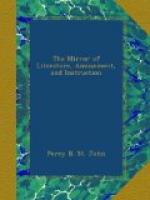If, when he reach’d his journey’s
end,
And warm’d himself in
court or college,
He had not gain’d an honest friend,
And twenty curious scraps
of knowledge;—
If he departed as he came,
With no new light on love
or liquor,—
Good sooth, the traveller was to blame,
And not the vicarage, nor
the vicar.
His talk was like a stream which runs
With rapid change from rocks
to roses:
It slipp’d from politics to puns;
It pass’d from Mahomet
to Moses:
Beginning with the laws which keep
The planets in their radiant
courses,
And ending with some precept deep
For dressing eels, or shoeing
horses.
He was a shrewd and sound divine,
Of loud dissent the mortal
terror;
And when, by dint of page and line,
He ’stablish’d
truth, or startled error,
The Baptist found him far too deep,
The Deist sigh’d with
saving sorrow;
And the lean Levite went to sleep,
And dream’d of tasting
pork to-morrow.
His sermon never said or show’d
That earth is foul, that heaven
is gracious,
Without refreshment on the road
From Jerome, or from Athanasius:
And sure a righteous zeal inspired
The hand and head that penn’d
and plann’d them;
For all who understood admired,
And some who did not understand
them.
He wrote too, in a quiet way,
Small treatises, and smaller
verses;
And sage remarks on chalk and clay.
And hints to noble lords and
nurses:
True histories of last year’s ghost,
Lines to a ringlet, or a turban;
And trifles for the Morning Post,
And nothings for Sylvanus
Urban.
He did not think all mischief fair,
Although he had a knack of
joking;
He did not make himself a bear,
Although he had a taste for
smoking:
And when religious sects ran mad,
He held, in spite of all his
learning,
That if a man’s belief is bad,
It will not be improved by
burning.
And he was kind, and loved to sit
In the low hut or garnish’d
cottage,
And praise the farmer’s homely wit,
And share the widow’s
homelier pottage:
At his approach complaint grew mild;
And when his hand unbarr’d
the shutter,
The clammy lips of fever smiled
The welcome, which they could
not utter.
He always had a tale for me
Of Julius Caesar, or of Venus;
From him I learn’d the rule of three,
Cat’s cradle, leap-frog,
and Quae genus:
I used to singe his powder’d wig,
To steal the staff he put
such trust in;
And make the puppy dance a jig,
When he began to quote Augustin.
Alack the change! in vain I look
For haunts in which my boyhood
trifled;
The level lawn, the trickling brook,
The trees I climb’d,
the beds I rifled:
The church is larger than before;
You reach it by a carriage
entry;
It holds three hundred people more,
And pews are fitted up for
gentry.




